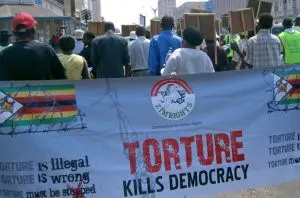
The Business Day
THE North Gauteng High Court’s interpretation of the Implementation of the Rome Statute of the International Criminal Court (ICC) Act has set a precedent, with South African authorities now required to probe allegations of crimes against humanity, even those unconnected to South Africa.
This is the submission by the national director of public prosecutions (NDPP), who is applying for leave to appeal to the Supreme Court of Appeal against last year’s judgment by Judge Hans Fabricius, which ordered South African authorities to investigate Zimbabwean officials accused of committing crimes against humanity.
The high court had refused leave to appeal.
The National Prosecuting Authority (NPA) and the police then petitioned the appeal court, which referred the application for oral argument. After this, the court will decide whether to hear the merits of the appeal.
The matter, which will have far-reaching implications for law enforcement in South Africa, will be heard next month. The judgment by the North Gauteng High Court clarified that the police and the NPA’s priority crimes litigation unit had a duty to probe allegations of torture as required by the ICC act. As a signatory to the Rome statute setting up the court, South Africa committed itself to investigate and prosecute perpetrators of serious international crimes.
The matter began in 2008 when the Southern Africa Litigation Centre submitted a dossier to the NPA containing comprehensive evidence of the involvement of 18 Zimbabwean security officials in perpetrating torture, and requested the NPA and police to initiate an inquiry.
The NPA and the police refused, so the centre and the Zimbabwe Exiles Forum took the decision on review to the high court. The NPA’s counsel said the preamble to the domestic ICC Act stated that it was intended to “provide for the prosecution in South African courts of persons accused of having committed the said crimes in South Africa, and beyond the borders of South Africa in certain circumstances”.
In their heads of argument on behalf of the NDPP, Cedric Puckrin, Raymond Macadam and Susan Bukau said it was accepted that under certain circumstances a crime committed outside the state may be criminalised by such state. They said the interpretation of the statute would exclude the law from being applicable to crimes committed outside South Africa.
Counsel for the centre and the forum, Wim Trengove, Gilbert Marcus and Max du Plessis, said South African law permitted a probe of international crimes committed within South Africa and abroad.
“International law does not require an accused person’s presence within the state’s territory for a lawful investigation of international crimes committed abroad,” they said.
http://www.bdlive.co.za/national/law/2013/10/15/reach-of-rome-statute-to-head-back-to-appeal-court



